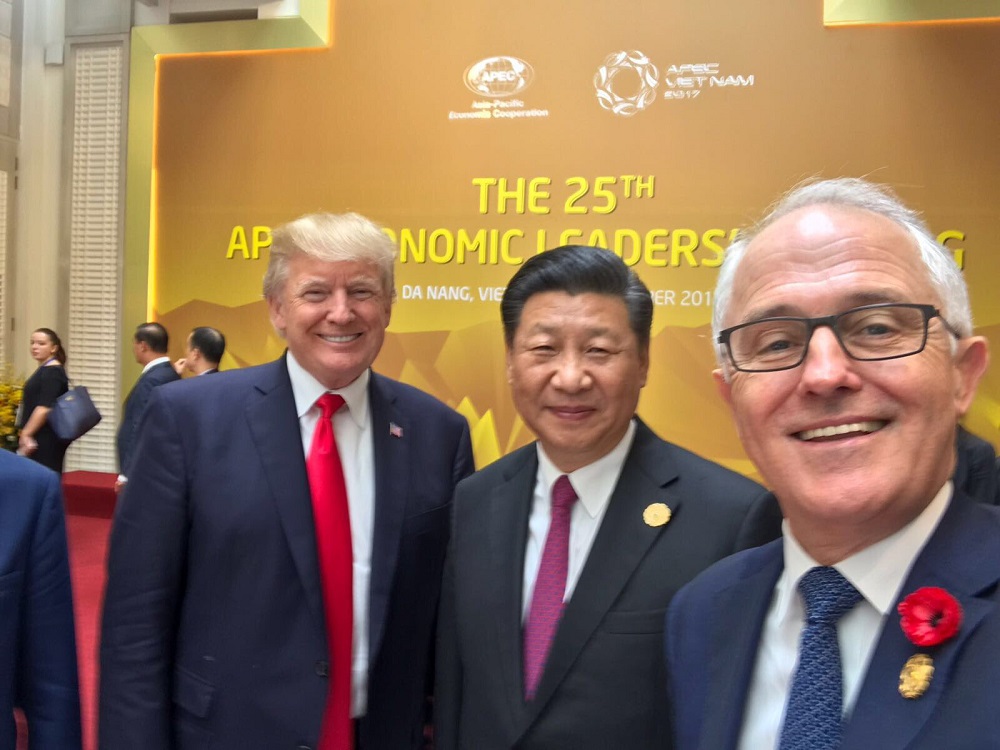
Australia must both hug the panda and slay the dragon. Simultaneously.
A quarter of Australia’s
international trade and well over a third of our exports go to a nation that might assault a Royal Australian Navy ship in the South China Sea. That ship fear shaped Malcolm Turnbull’s shift on China while he was prime minister.
The
trade boom benefit confronts the danger of security bang.
Turnbull, Australia’s 29th prime minister, once got the China relationship in one word:
‘frenemy’.
Turnbull’s predecessor, Tony Abbott, needed only three words for what drives our China policy:
‘fear and greed’.
Two Liberal prime ministers, who could agree on little else, concur on the challenge that is China.
While not reusing the ‘frenemy’ word, Turnbull’s memoir,
A bigger picture, devotes a chapter to China and that balance between friend and enemy. And how to deal with Beijing when it’s being a bully. That word ‘bully’ runs through the account.
Turnbull’s discussion of China’s island-building land grab in the South China Sea—‘to create facts on the ground, or above the water’—illustrates the tests and tensions.
Turnbull says he repeatedly told Chinese leaders that their strategy was counterproductive: ‘Was the tenuous advantage given by establishing these forward operating bases worth the tensions that it was creating?’
Australia doesn’t recognise the legitimacy of what China has built. But unlike the US Navy, the Royal Australian Navy doesn’t sail ships inside 12 nautical miles (the limit of territorial waters) of the new islands. Australia stays outside that zone to avoid a confrontation that ‘would easily play into China’s hands’, Turnbull writes.
The People’s Liberation Army Navy knows that if it conflicts with a US ship, it runs the risk of rapid escalation into full-blown conflict. But an Australian ship is a different proposition altogether. If one of our ships were to be rammed and disabled within the 12-mile limit by a Chinese vessel, we don’t have the capacity to escalate. If the Americans backed us in, then the Chinese would back off. But if Washington hesitated or, for whatever reasons, decided not to or was unable immediately to intervene, then China would have achieved an enormous propaganda win, exposing the USA as a paper tiger not to be relied on by its allies. My judgement was that given the volatile geopolitical climate at the time, especially between the USA and China, it wasn’t a risk worth taking.
The possibility of what China might do becomes a question of what the US would do. Australia does the panda–dragon balance while keeping a constant eye on Uncle Sam.
Turnbull hates being called a panda hugger. Yet his China chapter describes a hugger who slowly picked up the sword.
Start that journey from a
speech Turnbull gave in 2011 at the London School of Economics which rejected any thought that ‘China’s economic growth meant it was inevitably going to become a military threat’. The strategic response, he said, ‘should be to hedge against adverse and unlikely future contingencies as opposed to seeking to contain (futilely in all likelihood) a rising power’.
The 2011 speech had elements that ran through all of Turnbull’s later foreign policy thinking:
- China would become the world’s largest economy and, in time, a military equal of the US.
- China’s institutions and culture are very different to Australia’s, yet China is ‘in large measure responsible for our current and prospective prosperity’.
- Australia wants good relations with both the US and China but must deal with a multipolar world by drawing closer to other countries in Asia, ‘as we deepen our relations and trust with our neighbours’.
Zip forward six years to June 2017, when Turnbull saw ‘the gathering clouds of uncertainty and instability’ and warned that Asia couldn’t rely on China or the US ‘to safeguard our interests’. This was Turnbull’s
keynote address to the Shangri-La Dialogue in June 2017.
At the time, I called it a
Hunger Games vision and now rank the Singapore oration as the defining foreign policy speech of Turnbull’s prime ministership: toughen up to Beijing, tip-toe around Trump.
Turnbull’s Shangri-La hope was for a free and open neighbourhood, but the details had turned devilish. The region we wanted to help shape wasn’t emerging in the shape that we wanted.
The language about Beijing had become robust. In Turnbull’s words, it was a ‘dark view’ of a ‘coercive China’ seeking domination.
Turnbull’s memoir describes the atmosphere shaping the speech. Amid ‘a blizzard of often hysterical and frenzied commentary on the China relationship’, Canberra was working out how to cope with the ‘bullying tactics’ of a Beijing seeking ‘to supplant the United States as the leading power in the region’.
Criticising China meant consequences: ‘Ministerial visits would be stopped or curtailed, trade deals would be frozen or not followed through, Chinese tourism would drop off, foreign businesses in China would be boycotted.’
Charting what happened between those two speeches, Turnbull cites a maxim of defence strategy—capability changes over decades, but intent can change in a heartbeat:
In the six years between my speech at the LSE in 2011 and my Shangri-La address in 2017, China’s capabilities, in every respect, had continued to grow; but what had really changed was its intent. Under Xi, it became more assertive, more confident and more prepared to not just reach out to the world, as Deng [Xiaoping] had done, or to command respect as a responsible international actor, as Hu Jintao and Jiang Zemin had done, but to demand compliance.
Many elements combined to create the current
icy age between Canberra and Beijing; but if I had to select a public start date (as opposed to all the behind-the-scenes argy-bargy), I’d nominate that Shangri-La speech in June 2017. With that as the starting point, the
fifth Oz–China
icy age is entering its fourth year.
 Print This Post
Print This Post